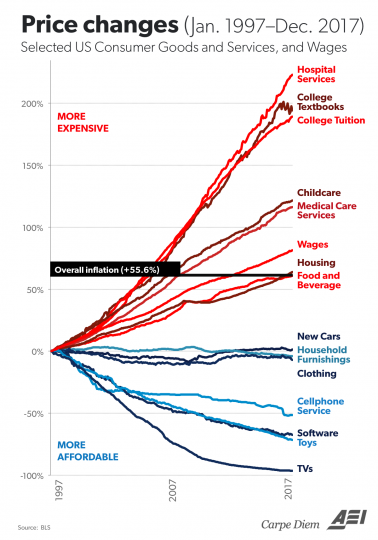I was glad to be able to engage P. J. O’Rourke in a wide-ranging discussion for the Acton podcast this week. In this episode of Acton Line, P. J. and I talk about “mutant” capitalism, cryptocurrency (neither of us really understand it), the state of the middle class, the Trump phenomenon, and much more, based on his latest book, None of My Business: P.J. Explains Money, Banking, Debt, Equity, Assets, Liabilities, and Why He’s Not Rich and Neither Are You.
One of the chapters of his book is titled, “The Price of Being Middle Class,” and P. J. runs through what life was like for him growing up in the middle of the twentieth century and compares that with what it might cost to have a similar upbringing today. The results are not pretty. As P. J. concludes, “In order to live an ordinary middle-class life, you have to be rich.”
If this is true, there are important causes as well as important downstream effects. The latter no doubt includes, at least to some extent, the increasing disaffection with political leadership in America. As for causes, it is worth looking at the history of how much things cost. Consider this chart, from AEI’s Carpe Diem blog:

Now the CPI is not without some limitations, and this chart only includes the last 20 years, not the last 70. It also doesn’t capture qualitative differences over time. Cars that are made today are in almost every way that matter are better than those made in the 1950s. Perhaps the quality of education today is just that much better than it was back then (I doubt it).
But even this bit of data shows some potentially significant things, including that areas that tend to receive greater governmental subsidies, regulation, and involvement tend to be things that cost more over time, and things that tend to be more subject to competitive market forces are relatively flat or even cheaper. And perhaps our definition of middle class needs to change; perhaps going into six-figure debt for a college education shouldn’t be a necessary part of the identification.
Check out the latest episode of Acton Line, None of My Business, and for those able to make it, P. J. will be joining the Acton Institute for an evening in Chicago on March 7.

